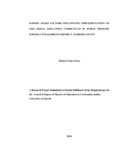| dc.description.abstract | Life skills are psychosocial competencies which enables an individual to develop
adaptive and positive behaviour. They are psychological and interpersonal
abilities that assist an individual to make informed decisions and develop coping
and self management skills to lead a healthy and productive life.
The purpose of this study was to investigate school based factors influencing the
implementation of life skills education (LSE) in public schools in Dagoretti
District, Kenya. Four research objectives were set to guide the study. They aimed
at assessing the availability and adequacy of teaching and learning resources in
LSE, analyzing the appropriateness of methodologies used in the implementation
of LSE. The study adopted the descriptive survey design. The target population
was 20 teachers and 300 pupils in standard 7 and 8 in public schools in Dagoretti
District. Simple random sampling technique was used to select the study
participants. Data were collected by use of questionnaires and focus group
discussion guides, data were analyzed by use of descriptive statistics.
The reliability of the research instruments was ascertained by a test and a re-test
exercise during the pilot study. The reliability value was r=0.54 signifying that the
instruments were reliable. Findings revealed inadequate time allocated led to
inadequate content coverage therefore affecting implementation of the LSE
curriculum. Findings on availability and adequacy of teaching and learning
resources on the implementation of LSE revealed that inadequate resources
hampered effective implementation of LSE.
Research findings also showed that teaching methodologies influenced
implementation of life skills education. Discussions and storytelling were
preferred by the majority of the teachers. Findings on the influence of learners’
attitudes on LSE implementation. revealed that learners had positive attitudes
towards LSE. Based on the findings, it was concluded that time allocated to LSE
affected LSE implementation. Based on the study, it was recommended that head
teachers should ensure that time allocated to LSE in their schools is in accordance
with the guidelines provided by KICD. The headteachers should supervise
teachers to ensure that LSE is taught. This study further recommended the
government through the Ministry of Education should enhance training for
teachers in LSE. Based on the findings, it was suggested that LSE be made an
examinable subject in order for teachers to treat it seriously. The study
recommended that further study be undertaken in both public and private schools
in other districts in the Republic of Kenya to establish implementation of LSE.
The Ministry of Education should invest in providing teaching/learning resources
for LSE | en_US |

